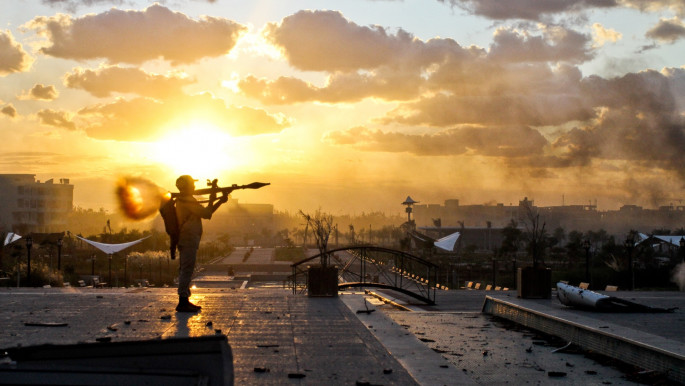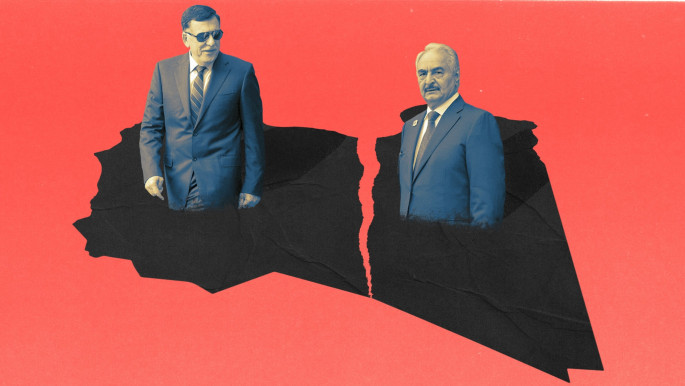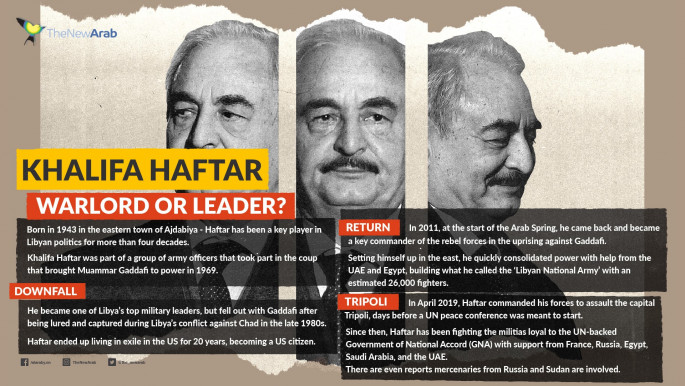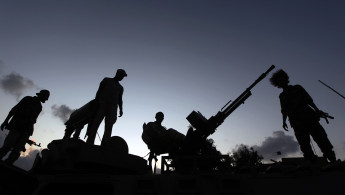After Haftar: What's next in Libya's conflict?
Questions now arise over Haftar's future and how international actors will respond. While there are talks of a ceasefire, it is important to remember that Libya was moving towards peace before April last year, but Haftar's campaign has shattered trust and prevented reunification.
His scrapping of the 2015 Libyan Political Agreement in April put the final nail in the coffin for any hopes of peace.
Meanwhile, because of the inactivity and general lawlessness of the international community, where the actions of global powers override international institutions, the conflict has been allowed to prevail.
Due to failed peace initiatives, Turkey's intervention has placed it as a dominant external actor, with its vital support enabling the GNA's successes while pushing Haftar back.
Now Turkey is shoring up its position in the country, looking to establish military bases and also develop the liberated al-Watiya airbase. Turkish companies ENKA and Çalik Holding are building power-plants to support GNA areas in western Libya.
 |
The dynamics of Libya's war have transformed considerably in recent weeks |  |
Forces aligned with the UN-recognised Government of National Accord are currently advancing towards Sirte and al-Jufra bases. Eventually they may look to capture Benghazi, which would ultimately bury Haftar's campaign.
Haftar's failed campaign has left him increasingly irrelevant and now criticisms of his role in Libya are growing. A Human Rights Watch report on Tuesday highlighted that Haftar's forces "apparently tortured, summarily executed, and desecrated corpses of opposing fighters."
 |
|
| Read more: France and Turkey's growing rivalry in the Middle East |
Meanwhile, the Libyan parliament asked the international community to probe for war crimes after over 100 bodies were found in Tarhuna, which GNA forces captured on 6 June. There are suggestions that Haftar's international backers will revise their support for his forces.
Aguila Saleh, speaker of the House of Representatives in Tobruk, eastern Libya, may be a viable replacement for the warlord, as he is diverging from Haftar's position. Russia, which backed Haftar, is considered to be looking to replace him and engage with Saleh - though Moscow still supports Haftar for now.
Egypt pushed for a ceasefire and political initiative to end the conflict on 6 June, which involved bringing Saleh to the table. Cairo may also consider him as a future option should Haftar endure further losses.
Egypt would prefer a compromise, yet its recent calls lack credibility, as it has supported Haftar's offensive and backed authoritarian military rule in Libya. Its backtracking attracts understandable scepticism. Egypt would also seek to prevent the GNA getting too close to its western border.
 |
Questions now arise over Haftar's future and how international actors will respond |  |
Less has been mentioned about the role of the United Arab Emirates (UAE). Though UAE Minister of State for Foreign Affairs Anwar Gargash publicly supported Cairo's initiative and called for "a withdrawal of foreign forces and a return to the political track", it has heavily invested in Haftar, and still sees him as a means to counter Turkey and disrupt Libya's stable democratic transition.
Though the UAE would struggle to push GNA forces back, it would still seek influence in eastern Libya. The UAE may also use its leverage over Egypt to prevent a peace deal that favours Turkey and halt any reunification with the GNA.
 |
|
| Read more: Is Libya on the road to de facto partition? |
It would oppose a Turkey-Russia agreement, which would marginalise Abu Dhabi's own influence. Ultimately, these differences could lead to a de facto, but likely unofficial, partition of Libya between the west and the east.
Though proposed talks were cancelled between Russia and Turkey on Sunday, highlighting their ongoing differences, both would still seek a compromise. Turkish Foreign Minister Mevlut Cavusoglu on Tuesday reiterated Ankara's desire for a ceasefire with Russia during a press conference with Iranian counterpart Javad Zarif.
 |
Turkey's intervention has placed it as a dominant external actor, with its vital support enabling the GNA's successes |  |
Libyan Foreign Minister Fathi Bashagha said on Monday that initiatives and solutions to end the crisis are welcome. Yet while a political solution remains absent, the GNA will push for more territory, ensuring that Haftar can no longer threaten Tripoli.
The GNA would also resist conceding influence early on, as doing so would prevent it regaining control over key territories and vital natural resources.
This will particularly be the case until Haftar genuinely commits to a peace deal. Yet seeing as he called for a 'holy war' in late May, it seems likely he would continue his efforts so long as he receives enough external backing.
Germany's Chancellor Angela Merkel on Tuesday backed Turkey's bid for a ceasefire in Libya, and supported the need to uphold UN peace efforts, while EU chief diplomat Josep Borrel called for EU unity to resolve Libya's crisis. NATO has shown greater interest in Libya, though so far only with statements.
 |
|
| Click to enlarge |
Yet France's individual role acts as a spoiler and divides Europe. On Tuesday, Turkish Foreign Ministry spokesman Hami Aksoy criticised France amid their souring relations over Libya and clashing interests in the Eastern Mediterranean. Though France's position on Libya is unclear, it has long backed Haftar and still opposes Ankara's influence.
Meanwhile Greece, which also has tensions with Turkey over the Eastern Mediterranean and has taken France's side, adds to these frictions.
Because of this wider incoherence within Europe, the EU has limits in its foreign policy efforts, including Operation IRINI, the EU naval mission designed to enforce the arms embargo. These divisions also benefit Russia, enabling Moscow to become a greater power broker in Libya.
The United States, despite a previously lacklustre stance on Libya, has shown further warmth to Turkey, after Donald Trump called Turkish President Recep Tayyip Erdogan on 8 June to discuss Libya's developments.
The two countries discussed "some agreements" that might open a "new era," according to Erdogan. Trump also surprised observers by calling for a ceasefire on 10 June, given Washington's past indifference to Libya.
While the United States has recently shown more interest in Libya, more tangible action would be needed to solve Libya's crisis.
As Libya analysts Ranj Alaaldin and Emadeddin Badi suggested, even if external actors stopped driving Libya's war, ongoing local grievances will prevent stability. Years of conflict and failing peace efforts have fermented distrust and tensions.
More mutual understanding and desires for peace between international actors are essential to reaching a viable political solution, or else a longer, drawn-out conflict will continue.
Jonathan Fenton-Harvey is a freelance journalist.
Follow him on Twitter: @jfentonharvey



